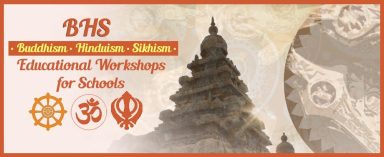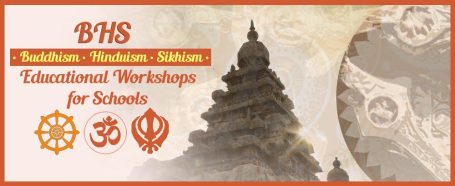KS3 and KS4 Modules
**Workshop Capacity:**
The typical attendance for a full-day workshop averages slightly over 240 students; however, we can accommodate up to 400 participants, albeit with a reduction in interactive elements and shorter session durations.
**GCSE and A-Level Lessons**
Various presentation formats are available to enhance your students' academic pursuits. Recognising that experiential learning remains invaluable at all educational stages, many secondary educators favour modules that integrate lectures and discussions with engaging cultural experiences.
Conversely, certain environments may necessitate a more traditional lecture-based approach complemented by standard question-and-answer sessions. Regardless of the preferred format, we are equipped to facilitate a wide range of thematic events, from introductory workshops to those tailored for GCSE and A-Level subjects, including inter-faith conferences.





Critical Thinking Module
This Secondary school module is also known in the Sanskrit language as Nyaya (method of thinking), which is comprised of three elements:
1. Curiosity: (Jijnasu), an inherent nature common to humans and even to the lower species. This natural phenomena is ultimately meant to lead one to research into the purpose of existence. Athato brahma jijnasa, "Now (that I am a human), is time to enquire into the Absolute Truth". (Vedanta Sutra 1.1)
2. Skeptisism: (Pariprashna), having a healthy questioning attitude and not blindly believing everything everyone tells you. This part of the lesson teaches us how there is a difference between submissive questioning and egotistic challenging. This is an art which is tempered by the third element.
3. Humility: (Dhainya), is the key too unlocking the door of understanding things as they are, rather than as we interpret them to be through the fickle mind and imperfect senses. The Vedic antonym of humility is 'Atmavan manyate jagat' - 'One sees all other like oneself'.
A Standard Hinduism Workshop
This workshop on Hinduism offers an extensive exploration of fundamental topics central to understanding the faith's essence. Participants will engage deeply with foundational texts such as the Vedas and Upanishads, which are the cornerstones of Hindu philosophical thought. The curriculum will critically examine the pivotal roles of principal deities – Brahma, Vishnu, and Shiva – within the cosmic order, thereby elucidating their significance in Hindu cosmology.
Moreover, participants will engage with the concept of Dharma, a vital guide for ethical living, alongside Karma, which embodies the moral dynamics of cause and effect—both are indispensable elements of Hindu belief systems. The intricacies of ritual practices, known as Puja, will be demonstrated to underscore their essential function in daily life and devotional activities.
The workshop will candidly address the contentious complexities of the caste system, providing a sophisticated understanding of the social frameworks that characterise Hindu communities.
Key festivals, including Diwali and Holi, will be examined to highlight their profound cultural and religious significance. Attendees will also acquire insights into meditation and yoga, recognised practices that facilitate personal and spiritual growth.
The curriculum will include informed discussions on contemporary challenges faced by Hindus, thus shedding light on the faith's evolution in the modern landscape.
This expertly crafted curriculum ensures a comprehensive and enriching engagement with Hinduism, empowering participants with invaluable knowledge and a deep appreciation for this venerable tradition.
The Essential Role of
Authority within Hinduism
In the diverse tapestry of Hindu spirituality, each role of authority serves a distinct and vital purpose. The purohit, or priest, is entrusted with the sacred duties of conducting temple rituals and overseeing significant rites of passage, such as marriages and naming ceremonies.
This function is essential, as it connects the adherents with the divine through time-honoured practices. The guru, a pivotal figure in this framework, imparts profound spiritual wisdom to their disciples. They offer not merely instruction in spiritual theory and practice, but also tailored guidance, enabling each individual to navigate their unique spiritual path with clarity and purpose.
The sadhu, which denotes a holy man or woman, represents a broad spectrum of spiritual practitioners who inspire others on their spiritual journeys, providing essential motivation and enlightenment.
Lastly, the sannyasin, a monk who has renounced worldly attachments, epitomises a life of detachment and universalism. With a vision that encompasses the world as one family, the sannyasin wanders from community to community, devoid of a permanent home.
This monk shares wisdom drawn from sacred texts and offers counsel to all who seek enlightenment, reaffirming the timeless quest for spiritual truth.
The Main Hindu Denominations
Students undertake a comprehensive examination of the principal denominations within Hinduism, with particular emphasis on the advaita and dvaita traditions.
Advaita is distinguished by its doctrine of non-dualism, asserting the concept of ultimate oneness, while dvaita encompasses a range of dualistic philosophies that significantly diverge from this perspective.
This course enables a rigorous analysis and comparison of these opposing worldviews and their profound implications for religious praxis. Within this framework, students are afforded the opportunity to investigate pivotal figures known as sampradaya acharyas, who have been instrumental in shaping these traditions.
Among the notable founders is Shankaracharya (788-820 CE), the paramount architect of the advaita denominations.
The four foremost Vaishnava sampradaya acharyas include
Madhva Acharya (1238-1317 CE) of the Brahma Sampradaya; Ramanuja Acharya (1017-1137 CE) from the Shri Sampradaya;
Nimbarka Acharya, who was born in 1162 CE and is affiliated with the Kumar Sampradaya;
Vishnu Swami, traditionally credited with contributions to the Rudra Sampradaya in the third century BCE.
Values and Moral Issues
Students rigorously examine the influence of pivotal philosophical concepts—including atman, reincarnation, moksha, and karma—on lifestyle decisions and moral choices regarding critical issues such as war and peace, abortion, euthanasia, and crime and punishment.
This exploration delves into the profound implications these ideas hold, shaping ethical frameworks and guiding personal and societal values in responding to complex moral dilemmas.
Non-Violence and Animal Rights
Students engage in an in-depth exploration of non-violence towards animals, acquiring a thorough understanding of the significance of the cow within Hinduism.
This examination elucidates the intrinsic connection between vegetarianism and compassion for all living beings, illustrating how these principles collectively enhance the well-being of individuals, support environmental sustainability, and bolster economic viability.
We need your consent to load the translations
We use a third-party service to translate the website content that may collect data about your activity. Please review the details in the privacy policy and accept the service to view the translations.

